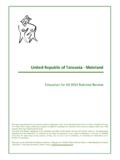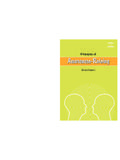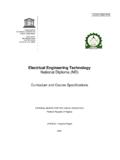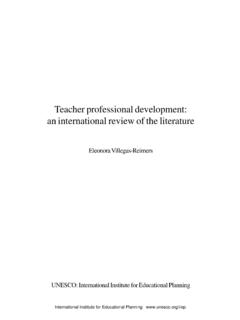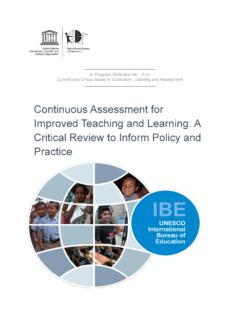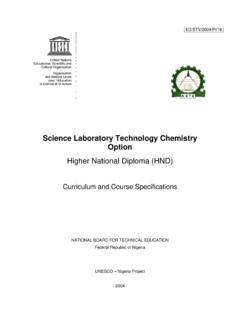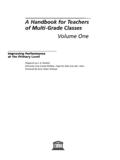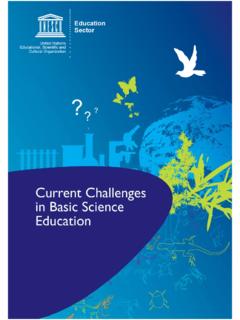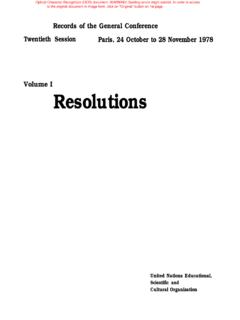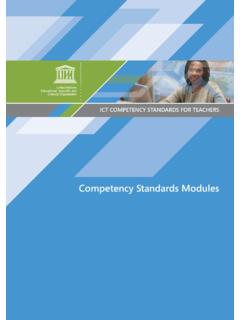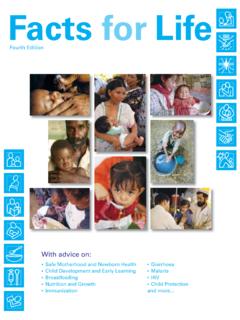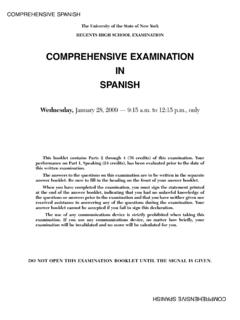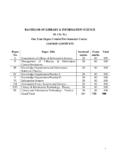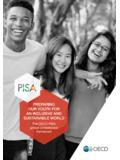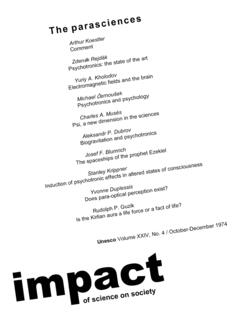Transcription of What is adult education? UNESCO answers; 2006
1 1 Juan Ignacio Mart nez de Morentin de Go i what IS adult education ? UNESCO answers Editorial San Sebastian UNESCO Centre 2 Cover photo: UNESCO Library (33nd General Conference). San Sebastian UNESCO Centre (12/10/06) Original title: Qu es la educaci n de adultos? Responde la UNESCO Translation: Paul Feith This book is not an official document of UNESCO Juan Ignacio Mart nez de Morentin de Go i UNESCO Training Centre-Florida Eskola San Sebastian UNESCO Centre 1st edition: Novembre 2006 ISBN 84-88737-70-X : SS/1442/06 Printed in San Sebastian (Grupo Delta) 3 Index Pag. Introduction .. 5 I. The context of adult education .. 7 II. adult education (1946-1958).. 17 adult education and universalisation .. 19 Characteristics of adult education .
2 26 III. Lifelong education and adult education (1960-1980) .. 41 Lifelong education .. 41 Recommendation on the Development of adult education (1976) .. 56 IV. adult education (since 1980) .. 71 education for all throughout life .. 75 Learning without Frontiers .. 82 V. adult education and other educational systems 87 adult education and fundamental education .. 88 adult education and out-of-school education .. 109 adult education and literacy .. 114 VI. Corollary .. 119 adult education .. 119 Lifelong education .. 122 5 Introduction The concept of adult education tends to be thought of as an educational process for adults . However, this is not the sphere in which adult education acts. education is adult education : for forming adults .
3 education is to become mature. This principle is valid in any stage of one s life. education is the education of children, youth, adults and seniors with the endless aim of forming a responsible being. Even though levels of responsibility may vary, what does not change is that the response must always be convincing and conveniently committed. When UNESCO works to achieve their objectives, which is international education for peace, it does so urging that this aim be taken seriously, maturely and as an adult throughout all stages of life and as each circumstance demands. 6 For UNESCO there is not an educational process if there is not a slow acquiring of values that guarantee a peaceful coexistence. adult education is synonymous with education in general.
4 Both expressions adult education or education by itself- indicate their goal: the appropriation of a spirit capable of transforming minds in any place and time. This book offers a vision of the resolutions and decisions of UNESCO s general conferences and Executive Board meetings on adult education from 1946 to 2005. 7I The context of adult education The adult education process drives towards the achievement of the capability to individually use reason on the subject matter in question. adult education is oriented at the use, at any age, of attitudes and skills prone to clarifying any distortions in communication, favouring why, how, when and where as well as the what for in all situations. The Recommendation on the Development of adult education affirms that civic, political, trade union and co-operative education activities should be aimed 8particularly towards developing independent and critical judgement and implanting or enhancing the abilities required by each individual in order to cope with changes affecting living and working conditions, by effective participation in the management of social affairs at every level of the decision-making process1.
5 In the process of achieving adulthood, we must perform the following actions: investigate, reflect, report, decide, receive information and organise it, plan, ask and study. These actions help us to acquire truthful and quality knowledge; to define the strategies and adjust them to reality; focus new options or offer alternative explanations to the information; and to unmask any distortions and deformations. The Recommendation supports these type of activities by saying, 1 UNESCO , Records of the General Conference. Volume 1. Resolutions, Annex I. Recommendation on the development of adult education . Content of adult education , resolution 19C/Annex , Paris, 1976, p. 7. 9generally speaking, the aims of adult education should be to contribute to: [.]
6 ] developing a critical understanding of major contemporary problems and social changes and the ability to play an active part in the progress of society with a view to achieving social justice; [..] developing the aptitude for acquiring, either individually, in groups or in the context of organized study in educational establishments specially set up for this purpose, new knowledge, qualifications, attitudes or forms of behaviour conducive to the full maturity of the personality; ensuring the individuals conscious and effective incorporation into working life by providing men and women with an advanced technical and vocational education and developing the ability to create, either individually or in groups, new material goods and new spiritual or aesthetic values; [.
7 ] developing the necessary discernment in using mass communication media, in particular radio, television, cinema and the press, and 10interpreting the various messages addressed to modern men and women by society2. This is why it also says that the education of young people should progressively be oriented towards life-long education and learning, taking into account the experience gained in regard to adult education , with a view to preparing young people, whatever their social origins, to take part in adult education or to contribute to providing it. To this end, measures should be taken with a view to: modifying school and training syllabuses with the aim of maintaining and stimulating intellectual curiosity, and also placing greater emphasis, alongside the acquisition of knowledge, on the development of self-teaching patterns of behaviour, a critical 2 UNESCO , op.
8 Cit. in note 1, Objectives and strategy , resolution 19C/Annex (b).(f).(g) and (j), pp. 4-5. 11outlook, a reflective attitude and creative abilities3. These theories have not been heavily modified, but they have been extended and specified. For example, the term adult education denotes the entire body of organized educational processes, whatever the content, level and method, whether formal or otherwise, whether they prolong or replace initial education in schools, colleges and universities as well as in apprenticeship, whereby persons regarded as adult by the society to which they belong develop their abilities, enrich their knowledge, improve their technical or professional qualifications or turn them in a new direction and bring about changes in their attitudes or behaviour in the twofold perspective of full personal development and participation in balanced and 3 UNESCO , op.
9 Cit. in note 1 Relations between adult education and youth education , resolution 19C/ Annex (c), p. 11. 12independent social, economic and cultural development4. In developing the concept of adult education we can classify three periods. The first period is between 1946 and 1958. This period focuses on the idea of reconstructing the educational structures affected by World War II; the interest of establishing complete educational programmes; favouring free and obligatory education ; and for universal education . The ten general conferences celebrated in those first twelve years highlighted those worries and interests, which had repercussions in the valuation of the concept of adult education . The second period is between 1960 and 1976. The use-for the first time in 1960-of the concept of a lifelong education is the beginning of a more explicit discourse in regards to adult education .
10 It then acquires the characteristic of a 4 UNESCO , op. cit. in note 1, Definition , resolution 19C/Annex , p. 4. 13defining and unifying concept in education for becoming adults , which is permanent. UNESCO will greet it enthusiastically by considering it capable of framing and uniting the Organization s importance on education , and since it can organise all of the developed educational processes into a single common principle: grade school, out-of-school, primary school, secondary, school, higher, professional, formal and non-formal education . If education is defined as lifelong education , and adult education includes all processes of education , adult education and lifelong education unite into a single reality. From this we can affirm that all educational processes must be carried out within the context of lifelong education or adult education .
